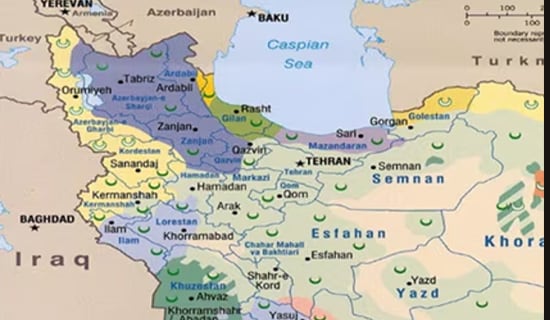Introduction
Almost two months after the conclusion of the parliamentary elections in Iraq, there is still no new government, and the prospects of breaking the stalemate that has so far impeded the creation of such a government are not within sight. In fact, it would seem that the longer the stalemate prevails, the greater the number of complexities that emerge to muddy the waters. A contributing factor to these complexities is Iran's Trojan horse in Iraq.
The Iranian Trojan Horse – The Accountability and Justice Commission (AJC)
According to Greek mythology, the Greeks presented the citizens of Troy with a large wooden horse, in which they had secretly hidden their warriors. During the night, the warriors emerged from the wooden horse and overran the city.
The role played by the Accountability and Justice Commission (AJC) under the chairmanship of Ahmad Chalabi, one of the most pro-Iranian politicians on the Iraqi scene, and its executive director Ali Al-Lami, is the closest thing to an Iranian Trojan horse in Iraq. This assertion is supported by a statement in February 2010 by the commanding officer of the U.S. forces in Iraq, General Ray Odierno; he said that, based on intelligence, both Chalabi and Al-Lami were acting under Iran's influence. In fact, the U.S. considers Al-Lami to be an agent of the Iranian intelligence service.[1]
The AJC, formerly known as the "De-Bathification Commission," was dormant for years, but suddenly and unexpectedly came to life a few days before the parliamentary elections, set for March 7, 2010, when it barred over 500 candidates from running, most of them from Ayad Allawi's Al-Iraqiya slate, for allegedly Ba'thist background or Ba'thist sympathies. Among those barred was the most senior Sunni politician, Saleh Al-Mutlak.
Most Iraqis abhor the Ba'th party, which ruled Iraq for 35 years, including 30 years under Saddam Hussein. The main thrust of criticism against AJC's decision to bar the alleged pro-Bathist candidates from participating in the general elections focused on the absence of a credible due process that would have allowed those accused to present evidence to the contrary, and, more significantly, on the timing of the announcement, which was viewed as an attempt to undermine the prospects of Ayad Allawi, who was viewed by Iran as too secular and too close to the Saudi regime.
The AJC again resurfaced, and this time with even greater destructive force, after the announcement of the election results, which gave Allawi a two-seat advantage over his closest rival, Prime Minister Nouri Al-Maliki's State of Law - 91 seats vs. 89 seats. The AJC declared that 52 candidates who ran in the elections, including at least two who were duly elected to parliament as members of Al-Iraqiya, ought to be disqualified for alleged Ba'thist affiliation. The AJC went a step further than that by calling on the Elections Commission to discard the votes cast in favor of these 52 candidates and to recalculate the allocation of seats among the winning slates based on a new vote count. The results would mean that Al-Iraqiya could lose at least two seats, bringing it down from the group with the largest number of seats in parliament to the second ranking list, and therefore denying Ayad Allawi the opportunity to form a government as its leader.
Al-Lami Accuses Washington of Attempting to Assassinate Him
To compound the uncertainty that he has injected into the political process with Iran's apparent full blessing, the executive director of AJC Ali Al-Lami yesterday accused the U.S. of planning to assassinate him and to put the blame for it on Al-Qaeda. He said that the U.S. was "vengeful" over his effort to prevent the American plan to restore the Ba'th Party to power. The alleged plot to liquidate him was reportedly conveyed to him by the Iraqi Intelligence Service (mukhabarat) based on information leaked by a "senior source" in the U.S. Embassy in Baghdad. [2] A leader in Al-Iraqiya characterized Al-Lami's allegation as figment of his [Al-Lami's] imagination, supported by "known regional fronts" linking to Iran. Previously, Al-Lami spent 18 months in an American prison on suspicion of undertaking terrorist activities.[3]
Government Spokesman Critical of AJC
Ali Al-Dabbagh, spokesman for the Iraqi government (who was elected to parliament under Al-Maliki's list, State of Law) expressed "unprecedented criticism" of the AJC's decision to exclude some candidates from the political process. He said that the AJC's decision would create tension between the political groups, and indeed, the "the political situation in Iraq cannot bear marginal crises that do not serve the interest of the country."[4]
In an interview with the liberal website Elaph, Al-Dabbagh confirmed that there were efforts to restructure the AJC so that the country would not "fall under the whims of a limited number of individuals who create consecutive crises in the political situation."[5]
Iran's Preference for Prime Minister
Iran sought for months prior to the elections to unify the two main Shi'te groups – Al-Maliki's State of Law and Ammar Al-Hakim's Supreme Islamic Council, which is the key element in the Iraqi National Alliance. Having failed in its effort, Iran has engaged in subversive activities – mainly, but not exclusively, through the AJC – to exclude Allawi, a liberal-secular Shi'ite leader, as a prime minister. Al-Arabiya TV director Abd Al-Rahman Al-Rashed was quite accurate when he characterized the action of the AJC as a "conspiracy" to bring down Allawi as a potential prime minister.[6]
Conclusion
The ruling by the AJC to exclude, ex post, votes cast in favor of candidates accused of Ba'thist sympathies, and Al-Maliki's demand, endorsed by the court, for the manual recounting of the votes cast in the Baghdad Province, have suspended serious discussion on the forming of the new government. In the meantime, everybody – Iran, the Arab states, Turkey, and others – keep meddling in Iraqi political affairs, making a political compromise all the more difficult to reach.
* Dr. Nimrod Raphaeli is a senior analyst at MEMRI.








